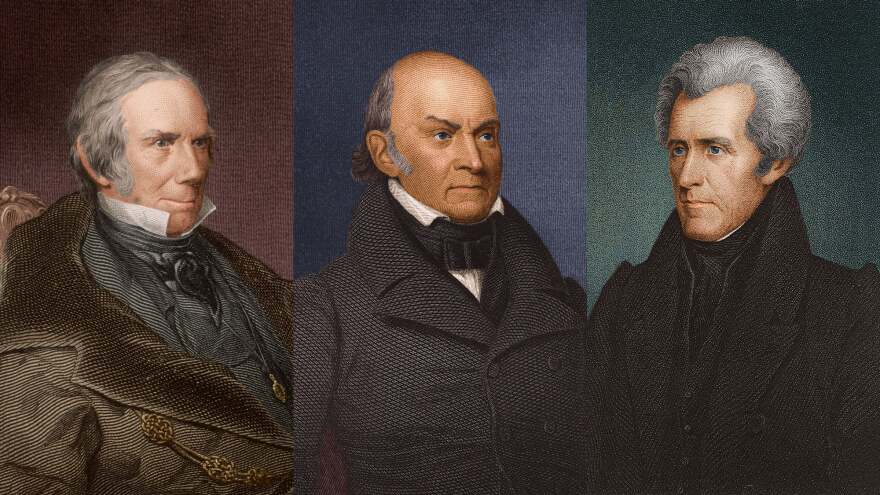In the next installment of Uncommon History, WKMS Morning Edition host Daniel Hurt speaks to Brent Taylor, West Kentucky Community & Technical College's associate professor of history, about an 1820s political deal that cost Andrew Jackson his first bid for the White House. Hurt and Taylor also discuss Kentucky's role in what became known as the "corrupt bargain."
Andrew Jackson might have won the popular vote for the presidency in 1824, but because nobody won the electoral college, a deal was struck with the third-place finisher, Kentucky's Henry Clay. The U.S. House of Representatives decided the winner, putting President John Quincy Adams in the White House. After Adams assumed office, he nominated Henry Clay to serve as Secretary of State, which, at the time, had been the recognized pathway to the presidency. Jackson described this deal between his two political rivals as a "corrupt bargain," vowing to seek the presidency again in 1828.
Taylor said that the election results producing no clear winner was a problem because it allowed dealmaking once the decision moved to the House. "Now you've got this whole big situation," he said. "We're up in the air. We don't know who the president is going to be. It goes to the House to pick the president. This is just ahead of where the final vote in the House is going to be. They had a preliminary vote, which picked the top three. We've still got the final vote ahead. This is December 17. We're a full month plus into this. No president."
Taylor discovered a discussion between Adams and Clay about the political deal in Adams' diary. "We're going to get the inside scoop," Taylor continued. "Robert Letcher, a Kentucky representative, comes to meet with Adams." He read from the diary: "'Letcher came, ostensibly with a claim of an assistant to the marshal of Kentucky, for additional compensation for his service in taking the census of 1820. His apparent main object was to talk about the presidential election."
Taylor said that Letcher was serving as a liaison between the two political factions. "You've got Adams, Clay, and Jackson. Clay is running about third in this. That's kind of where this is all going to get interesting. We've sent the go-between here. You're basically deciding between one and two, and one is Jackson, who is leading, but he doesn't have the majority. The second is John Quincy Adams. The plot is going to thicken here a little bit. This is the ultimate backroom deal."
Taylor continued to read from the diary, showing how ambiguity was used to obscure political intrigue. "'Letcher wished to know what my sentiments toward Clay were,'" Taylor read. "'I told him without disguise that I harbored no hostility against him. Whatever a difference there had been between us had arisen altogether from him and not from me. He was sure Clay felt no hostility to me. He had spoken respectfully of me and was a man of sincerity."
Taylor said Clay's people made it clear to Adams that they reserved no hostility toward him and wanted to potentially expand his support, depending on whether he was willing to offer him some kind of concession to get out of the race and support him, placing him over the top into the White House. Naturally, Taylor said, Letcher would never claim to speak officially for Clay or have any authority to make decisions for him. Although, it is unlikely the conversation would be taking place were that actually the case."
"Letcher didn't profess to have any authority from Clay for what he said," Taylor explained. "He made no definite propositions." He read from the diary: "'He spoke of his interview with me as altogether confidential. In my answers to him, I spoke in mere general terms." Taylor said this kind of coy and ambiguous language was common in political dealmaking. This led to the deal between Adams and Clay, resulting in the former taking office as president and the latter as Secretary of State. Jackson was outraged."
"That's exactly how it worked out," Taylor said. "We're going to throw all the support we can behind Adams. Adams is going to leapfrog over Andrew Jackson into the number one spot. Then, who gets the cushy new job as Secretary of State, the path to the presidency? Henry Clay of Kentucky."
Taylor explained that President Adams' diary entry could certainly be interpreted as the deal that Jackson said happened, coining it the "corrupt bargain." That's the hard evidence about the corrupt bargain right there," Taylor said. Ultimately, in 1828, Jackson challenged the then-incumbent President Adams and defeated him, ending his political career of nearly two decades. Jackson would go on to serve two terms.
To read more installments of Uncommon History, click here.





